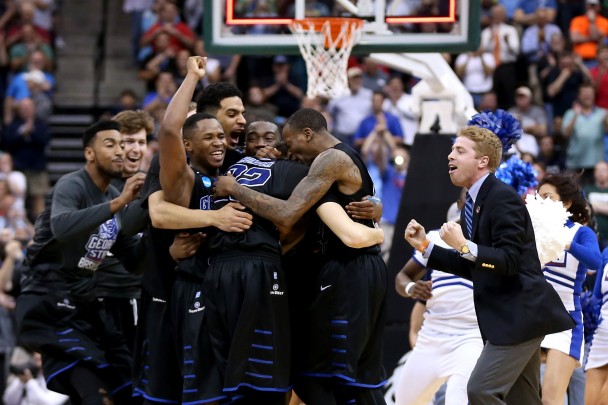Last March, Oklahoma State — with Marcus Smart, a top-six NBA draft pick — was the eighth seed in the Big 12 tournament. That eighth seed in the Big 12 Conference was higher than the No. 9 seed the Cowboys received in the 2014 NCAA Tournament.
Seeing Oklahoma State as the 8 seed in an above-the-rim Big 12 quarterfinal against top-seeded Kansas made it hard to think that the Big 12 would experience a disappointing March.
Then came the Madness.
Kansas didn’t make the Sweet 16. Oklahoma lost its first game. So did Oklahoma State and Kansas State. Texas actually did well, but it still didn’t escape the first weekend. Only Iowa State and Baylor moved to the Sweet 16, and both squads couldn’t make the Elite Eight. The Big 12 was a superb basketball conference from November through early March of the 2013-2014 season, but in the second half of March, it wilted.
There has to be an allowance for the fragile and tenuous nature of one-and-one basketball. Four months should be given their rightful place in helping to establish one conference over another. Yet, any sport demands that a team or group of teams perform their best when the lights are at their brightest. Coaches, schools, conferences — they’re not going to break through every year. They’re not always going to get the right bounce of the ball. Mature people with an allowance for life’s imperfections, odd bounces, and bits of bad luck can accept and understand this.
However, when you fall flat on your face two years in a row? That’s a cause for concern.
With Baylor joining Iowa State as a 3 seed to lose to a 14 on the first day of the NCAA tournament (and in the first four hours of the event at that), the early hour already grows late for the Big 12.
It was readily acknowledged by most college basketball observers this season that while the Big 12 didn’t have a big hitter — this is, for instance, not one of Bill Self’s stronger Kansas teams — the conference still possessed a lot of depth. The Big 12 might not have an abundance of greatness, but it does possess plenty of solidity. The likes of Iowa State and Baylor and West Virginia were never consistent during the season, but they all did special things at times, special enough to claim top-5 regional seedings and bracket paths which pointed to Sweet 16 appearances.
That last sentence points to the main objective for the Big 12 entering this tournament. The league should not have been expected to crash the Final Four from multiple angles, or even with one team (though Iowa State seemed to have a bracket path laden with opportunities in the South Region). The Big 12’s main goal was to get a large cluster of teams to the second weekend. That would have affirmed the depth the league displayed all season.
There’s still time and opportunity for Oklahoma, Kansas and West Virginia to get something done in this regard (at the time this piece is written, none of those teams have yet taken the court in a round-of-64 game). Neither Texas nor Oklahoma State are supposed to get out of the first weekend.
The bottom line for now is that the Big 12 has already lost two of its five realistic Sweet 16 aspirants, 40 percent of its collection.
As Yogi Berra said of playing outfield at Yankee Stadium in the fading World Series light of October, “It gets late early out there.”
That’s the Big 12’s world on the eve of baseball season.
